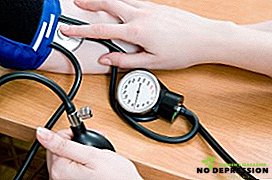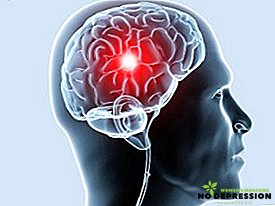Dizziness and nausea are unpleasant for people and frequent symptoms that doctors hear from patients at the reception. Female representatives suffer from these unpleasant ailments more often than men.
Many do not pay attention to the manifestation of such unpleasant, sometimes sudden, ailments, such as the appearance of dizziness, nausea, drowsiness, writing them off to overwork and a fast pace of life. However, especially often recurring, these phenomena can talk about serious diseases that require immediate treatment.

A person’s sense of balance is formed by receptors located deep in the inner ear, through which signals are transmitted to the cerebellum and the cerebral cortex. For various reasons, a malfunction of this system may occur, then a person can observe how everything has "floated" before his eyes, that is, to experience dizziness.
At the same time, the ears may be buried, an attack of nausea may begin, and rapid heartbeat may occur.
Dizziness is not always a valid cause of a malfunction in the body and a signal for anxiety and panic. Causes that are not signs of a serious illness:
- Sharp change in body position.
- Chronic lack of sleep.
- Constant stressful situations.
- Chronic exhaustion.
- Lack of vitamins in the body.
- Constant diets and fasting.
- Lack of oxygen.
Dizziness and nausea: causes in a woman
Causes of dizziness and nausea in men and women are similar. However, women are more vulnerable and more dizzy, and they have more reasons for nausea.
Independently diagnosing is very difficult, because there are a lot of diseases that are dizzy, and they can cause disruption in completely different systems of the body.
To clarify the causes of dizziness and nausea, as well as diagnosis, you should consult a doctor, then undergo the necessary comprehensive examination with several specialists, such as an ophthalmologist, neurologist, otolaryngologist and others. Each specialist on the results of the survey makes its conclusions.
- Diets For the sake of beauty, women go on desperate steps and often follow strict diets.

- Pregnancy.
- Exacerbation of various diseases.
- Medication
- Strong stress. Unfortunately, women are very often worried and nervous under the circumstances of various kinds. Frequent stressful situations lead to a deterioration of work in the brain and oxygen starvation, which provokes dizziness.
- Weak vestibular apparatus. The weakness of the vestibular apparatus can manifest itself with motion sickness while driving in a vehicle, on a merry-go-round and other places where dizziness may occur.
- Chronic overwork, fatigue. All this causes an overstrain of the nervous system and oxygen starvation of the cells. Of course, this may be due to the intense process of work, study or in family life. Be sure in such cases requires a full rest, a long sleep.
- Magnetic storms that trigger drops in blood pressure, adversely affecting the work of the brain.
- Neurological problems, osteochondrosis, head and neck injuries.
Dizziness, nausea, weakness, drowsiness: causes in women
The constant feeling of weakness, tiredness, drowsiness, nausea and dizziness can be caused by the following reasons and be symptoms at the same time of many diseases:
- Hypotension - low blood pressure. Signs of low pressure in people are a manifestation of sudden fatigue and weakness, hot flushes of sweat, then
 person throws into heat. In such situations, it is desirable to sit down or lie down, sleep, drink sweet tea or strong coffee. Due to the lack of the necessary amount of oxygen for the brain due to insufficient blood circulation, dizziness and nausea can be added to the constant drowsiness and fatigue.
person throws into heat. In such situations, it is desirable to sit down or lie down, sleep, drink sweet tea or strong coffee. Due to the lack of the necessary amount of oxygen for the brain due to insufficient blood circulation, dizziness and nausea can be added to the constant drowsiness and fatigue. - Endocrine diseases. In diabetes, disorders of thyroid function, these symptoms can occur along with other signs of the disease.
- Renal pathology.
- Iron-deficiency anemia. It is associated with impaired hemoglobin production. People with low hemoglobin have pale skin, fatigue, apathy, and a constant feeling of fatigue. Along with these symptoms, hair loss and taste receptor distortion are often observed. It is because of the low hemoglobin in the blood that women experience dizziness during menstruation and pregnancy. Also, lovers of diets who do not properly and fully feed, there is a reduced hemoglobin. In such a situation, it is necessary to adhere to the correct diet, eating foods that increase hemoglobin. Especially useful are liver, walnuts, pomegranate, beets and other products.
- In weather-sensitive women, these symptoms may occur during magnetic storms.
 Depression. During stressful situations, the stability of the emotional background is disturbed, as a result of which thought processes are inhibited and the body tries to calm itself. In such a state, a person often begins to experience a feeling of drowsiness, fatigue, lethargy.
Depression. During stressful situations, the stability of the emotional background is disturbed, as a result of which thought processes are inhibited and the body tries to calm itself. In such a state, a person often begins to experience a feeling of drowsiness, fatigue, lethargy.- Use of certain types of drugs. During the course of taking certain medications, side effects such as drowsiness, nausea, weakness and drowsiness are observed.
- Often the cause of weakness, drowsiness, as well as dizziness and even bouts of nausea, may be constant lack of sleep, insomnia, the wrong daily regimen.
Nausea, vomiting, dizziness, weakness: causes in women
Attacks of dizziness in women are often accompanied by other ailments - weakness, nausea, and even vomiting. According to medical research, this is triggered by the following factors:
- Pregnancy.
- Weakness of the vestibular apparatus.
- Diseases of the gastrointestinal tract.
However, the manifestations of these ailments can be the cause and symptoms of very dangerous diseases:
- A sharp whirling of the head, the appearance of vomiting, weakness may be due to vestibular neuritis - inflammation of the inner-nerve.

- The cause of dizziness, severe headaches and vomiting can be a stroke. Then drowsiness, weakness and loss of orientation appear. Disturbance of speech and movement are the main symptoms and signs of a stroke.
- Brain tumors. Among the symptoms of brain intoxication, there is a headache with bouts of dizziness, lethargy and nausea, which can turn into vomiting. There may be other symptoms that should definitely pay attention, for example, constriction of the pupils, a feeling of dryness when swallowing. If these symptoms appear, you should immediately consult a doctor, and it is better to call an ambulance.
- Meniere's disease, in which there is severe dizziness and vomiting. A dangerous disease that causes hearing loss.
Causes of dizziness and nausea during pregnancy
For women, the appearance of dizziness, nausea and vomiting is a reason to visit a gynecologist.
During pregnancy, the woman's body undergoes a number of changes, due to which dizziness and nausea are frequent unpleasant phenomena. The norm is the phenomenon of dizziness in the first trimester of pregnancy when hormonal changes occur.
Also, the occurrence of dizziness throughout pregnancy with low blood pressure in a woman is considered the norm. Frequent gusts of nausea along with dizziness may be caused due to toxicosis.

In addition, one of the reasons for the appearance of these unpleasant symptoms can be a low level of hemoglobin and iron in the blood.
In any case, pregnant women need to follow the advice of a doctor, eat right and rest and sleep more.
What to do if you feel dizzy and nauseous
Unfortunately, in most cases, attacks of dizziness and nausea are not completely harmless, they can indicate the presence of any serious diseases and processes in the body. Short and rare manifestations of these symptoms in general do not cause inconvenience, but when these phenomena are regular and prolonged, attention should be paid to them.
Having established the cause of dizziness and finding out that it is not just an unpleasant sensation, but a sign of a disease, you should consult a doctor. First of all, it is necessary to exclude the factors provoking dizziness and nausea.

A doctor may be prescribed medication. However, do not take them for a long time. If the medicine does not help and persistent dizziness does not go away, the pathology and the cause are likely to be incorrectly determined. In addition, alternative methods are included in the treatment of vertigo:
- vacuum therapy;
- acupuncture;
- manual therapy;
- various physiotherapy.
If the medical examination did not reveal any pathologies and serious diseases, dizziness can be managed on its own, adhering to preventive measures:
- maintain a healthy lifestyle;
- to refuse from bad habits;
- spend more time outdoors;
- to eat properly and fully and consume enough liquid;
- If nausea attacks accompany you when you are rocking in vehicles, it is advisable to take pills for motion sickness half an hour before the trip.

In addition, regular exercise and sports have a good effect on the nervous system, train the vestibular apparatus and help strengthen the body.
When you need to see a doctor urgently
It is necessary to urgently call an ambulance and consult a doctor:
- If you experience dizziness, loss of consciousness.
- In cases of prolonged dizziness, which lasted more than an hour.
- With the appearance of vomiting and raising the body temperature.
Taking medications without a doctor’s control is not worth it, it can lead to complications and critical consequences.
To maintain your health, you need to consult a doctor in a timely manner, undergo regular examinations and, if necessary, begin the correct treatment. If you often experience fatigue, drowsiness, dizziness and nausea, it's time to think about your health.
In the next video - additional information about the causes of dizziness.



 person throws into heat. In such situations, it is desirable to sit down or lie down, sleep, drink sweet tea or strong coffee. Due to the lack of the necessary amount of oxygen for the brain due to insufficient blood circulation, dizziness and nausea can be added to the constant drowsiness and fatigue.
person throws into heat. In such situations, it is desirable to sit down or lie down, sleep, drink sweet tea or strong coffee. Due to the lack of the necessary amount of oxygen for the brain due to insufficient blood circulation, dizziness and nausea can be added to the constant drowsiness and fatigue. Depression. During stressful situations, the stability of the emotional background is disturbed, as a result of which thought processes are inhibited and the body tries to calm itself. In such a state, a person often begins to experience a feeling of drowsiness, fatigue, lethargy.
Depression. During stressful situations, the stability of the emotional background is disturbed, as a result of which thought processes are inhibited and the body tries to calm itself. In such a state, a person often begins to experience a feeling of drowsiness, fatigue, lethargy.










